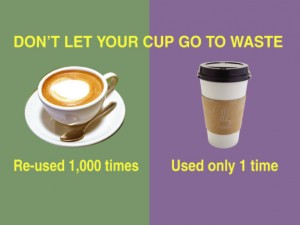Sustainable Caffeine
 The most challenging aspect of this past week has been changing my routine. There have been a few instances where I found myself reaching for a paper cup in lower, only to remember that I wasn’t supposed to. However, as the week went on, it was much easier to remember, and I even found that my routine began to change and adapt. I have found that by partaking in this experience, I have consumed much fewer cups of coffee. This is mainly because I find that carrying a mug around with me is too hard to remember and too inconvenient. If I find that I really want/need some coffee I have no problem remembering my reusable mug, and the benefits of coffee definitely outweigh the inconvenience of carrying a reusable mug around in those cases. The best part about this challenge is the flex that I have saved by drinking less coffee. Even though it’s only a few dollars, it definitely adds up over time. I also find that I am less rushed in the morning because I am not worrying about finding five minutes to get some coffee.
The most challenging aspect of this past week has been changing my routine. There have been a few instances where I found myself reaching for a paper cup in lower, only to remember that I wasn’t supposed to. However, as the week went on, it was much easier to remember, and I even found that my routine began to change and adapt. I have found that by partaking in this experience, I have consumed much fewer cups of coffee. This is mainly because I find that carrying a mug around with me is too hard to remember and too inconvenient. If I find that I really want/need some coffee I have no problem remembering my reusable mug, and the benefits of coffee definitely outweigh the inconvenience of carrying a reusable mug around in those cases. The best part about this challenge is the flex that I have saved by drinking less coffee. Even though it’s only a few dollars, it definitely adds up over time. I also find that I am less rushed in the morning because I am not worrying about finding five minutes to get some coffee.
Using a reusable mug is definitely more sustainable than buying paper cups in the long-run. However, one aspect that I did not initially consider was the environmental impact of creating and washing the reusable mug. Even though this also has an impact on the environment, studies show that after just a few uses the reusable mug becomes more sustainable. I have used my reusable mug a few times, so I am being more sustainable when using it. There have been a few times when I have surrendered to my caffeine addiction, but I have found a few more sustainable ways to do this. Organic coffee is more sustainable than nonorganic,and black tea is even better and emits only half the amount of carbon that a cup of coffee does (Wylie 2012). So if I do really need caffeine, I go for organic coffee or black tea. Even though I feel guilty about using a disposable cup, at least my caffeine choices are more sustainable.
https://alumni.stanford.edu/get/page/magazine/article/?article_id=28765
Leave a Reply